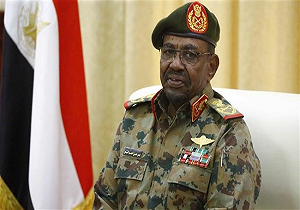TEHRAN, Feb 26 -Sudan’s President Omar al-Bashir has reshuffled his senior military staff right after granting sweeping new security powers to the police in an attempt to quell unprecedented nationwide demonstrations against his 30-year rule.
 TEHRAN, Young Journalists Club (YJC) - The Sudanese leader on Tuesday appointed General Essam al-Din Mubarak, the former deputy head of the military staff council, as the state minister of defense and switched positions of several other high-ranking military officials within the council.
TEHRAN, Young Journalists Club (YJC) - The Sudanese leader on Tuesday appointed General Essam al-Din Mubarak, the former deputy head of the military staff council, as the state minister of defense and switched positions of several other high-ranking military officials within the council.
“These are normal, routine changes that happen from time to time,” a military spokesman said in a statement.
In a bid to better contend with months of anti-government rallies, the 75-year-old Bashir on February 22 also announced a nationwide state of emergency; and on Monday he issued an array of edicts banning unlicensed public gatherings and giving sweeping fresh powers to the police.
Security forces are now allowed to search any building, restrict movement of individuals and public transport, detain anyone accused of committing a crime related to the state of emergency, and confiscate assets or property during probes.
Separately on Tuesday, the country’s public prosecutor said that emergency prosecutorial bodies would be set up across the African country to investigate any crimes committed under the new status.
On February 22, Bashir also sacked the governors of Sudan's regions and replaced them with military officials and those from security services.
On December 17, an anti-government campaign erupted over price hikes and shortages of food and fuel. The demonstrations first erupted in the farming town of Atbara after cash-strapped Khartoum cut a vital subsidy on bread and tripled its prices.
The move infuriated people and triggered protests, which swiftly mushroomed into nationwide anti-government rallies, particularly in the capital and its twin city of Omdurman. That initial public display of anger quickly spiraled into calls for Bashir, who took power in 1989 through a military coup, to step down.
The country’s National Intelligence and Security Service (NISS) has reportedly been carrying out a crackdown on protesters, opposition leaders, activists, and reporters in an attempt to prevent the spread of the rallies, which are viewed as the biggest threat to Bashir’s decades-long rule.
Official figures say 30 people, including some security agents, have lost their lives since the onset of the rallies. Some rights groups say at least 51 people have died so far.
Bashir has so far remained defiant, addressing loyalists at a number of rallies across the country and seeking support from regional allies.
The country’s security forces have so far used tear gas, stun grenades and live ammunition to break up demonstrations, and detained hundreds of protesters and opposition figures.
Bashir and other senior Sudanese officials have repeatedly said that the government can only be changed through elections. He is considering running for a third presidential term in next year's elections.
The African nation has been struggling with a worsening economic crisis, including a serious shortage of foreign currency. The cost of some commodities, including medicines, has more than doubled and inflation has hit 70 percent. A growing lack of food and fuel has also been regularly reported across several cities, including Khartoum.
Source: Press TV
 TEHRAN,
TEHRAN,